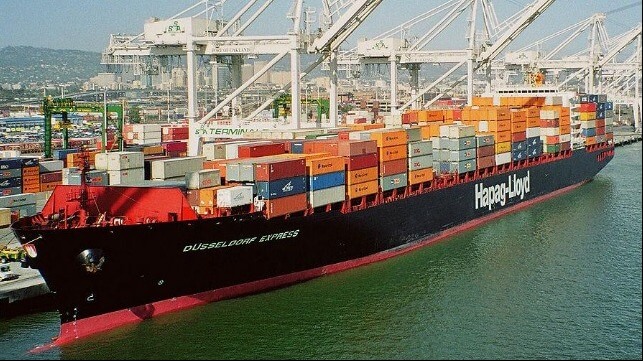Hapag and Seaspan Order up to 60 Methanol Engine Refits from MAN

Momentum for the adoption of methanol and ultimately green methanol within the maritime industry continues to gain momentum with Hapag-Lloyd and vessel owner Seaspan Corporation signing a conversion commitment agreement with MAN PrimeServ, the after sales division of MAN Energy Solutions. Last month, Maersk also announced plans to test methanol conversions with MAN for some of its in-service boxships while Stena announced that it would work with Wartsila for the conversion of some of its ferries.
MAN reports under the new agreement it will deliver 15 engine retrofit solutions for the conversion of vessels in the Seaspan fleet operating under long-term charters to Hapag. The agreement includes a further 45 optional engine retrofit solutions.
The vessels are currently powered by individual MAN B&W S90-type fuel-oil-powered engines and will become dual-fuel ME-LGIM engines capable of running on green methanol. Each conversion can provide a CO2 reduction of 50,000–70,000 tons each year according to MAN, when the engines are operating on green methanol.
“This agreement shows clear intent to drive the industry transition toward zero-carbon shipping,” said Thomas Leander, Head of Solutions and Site Manager, of MAN Energy Solutions. “Retrofitting existing engines to dual-fuel running is one of the most effective ways to reduce greenhouse gas emissions and to derive greater efficiency and profitability from an existing shipping fleet, while simultaneously delivering fuel flexibility and extending operational lifetimes.”
MAN highlights that it has developed an efficient retrofit solution for its popular ME-series, which has approximately 8,500 engines in service. Currently, they report, more than 100 ME-LGIM dual-fuel engines designed for green methanol operation are on order or in service.
Maersk reported that it plans to undertake the first refit in mid-2024 using one of its in-service vessels. MAN said the contract calls for the conversion of a total of 11 ships providing a solutions package comprising engineering, parts, project management, onsite technical assistance at the yard, sea-trial assistance, and recertification service during the work.
Stena offered few details on its plans saying that several ferries would be converted starting in 2025. The company, however, has experience using methanol for the past eight years, while Maersk will introduce its first new build to operate methanol in the coming weeks ahead of large, methanol dual fuel containerships scheduled to launch starting in 2024.

that matters most
Get the latest maritime news delivered to your inbox daily.
The interest in methanol is growing rapidly because of its current availability as a solution to reduce emissions. Methanol is already being used primarily for chemical tankers. The experience with the fuel means the bunkering and other infrastructure and experience exist versus other alternative fuels that are still being developed. In addition to the growing list of planned retrofits, there are more than 150 methanol-fueled vessels on order according to data from DNV.
While they strongly believe in the growing adoption of methanol, DNV however cautions of the near-term challenges. In their most recent update, DNV noted that “significant investments in green methanol production are needed,” to meet the projected demand for the alternative fuel.
